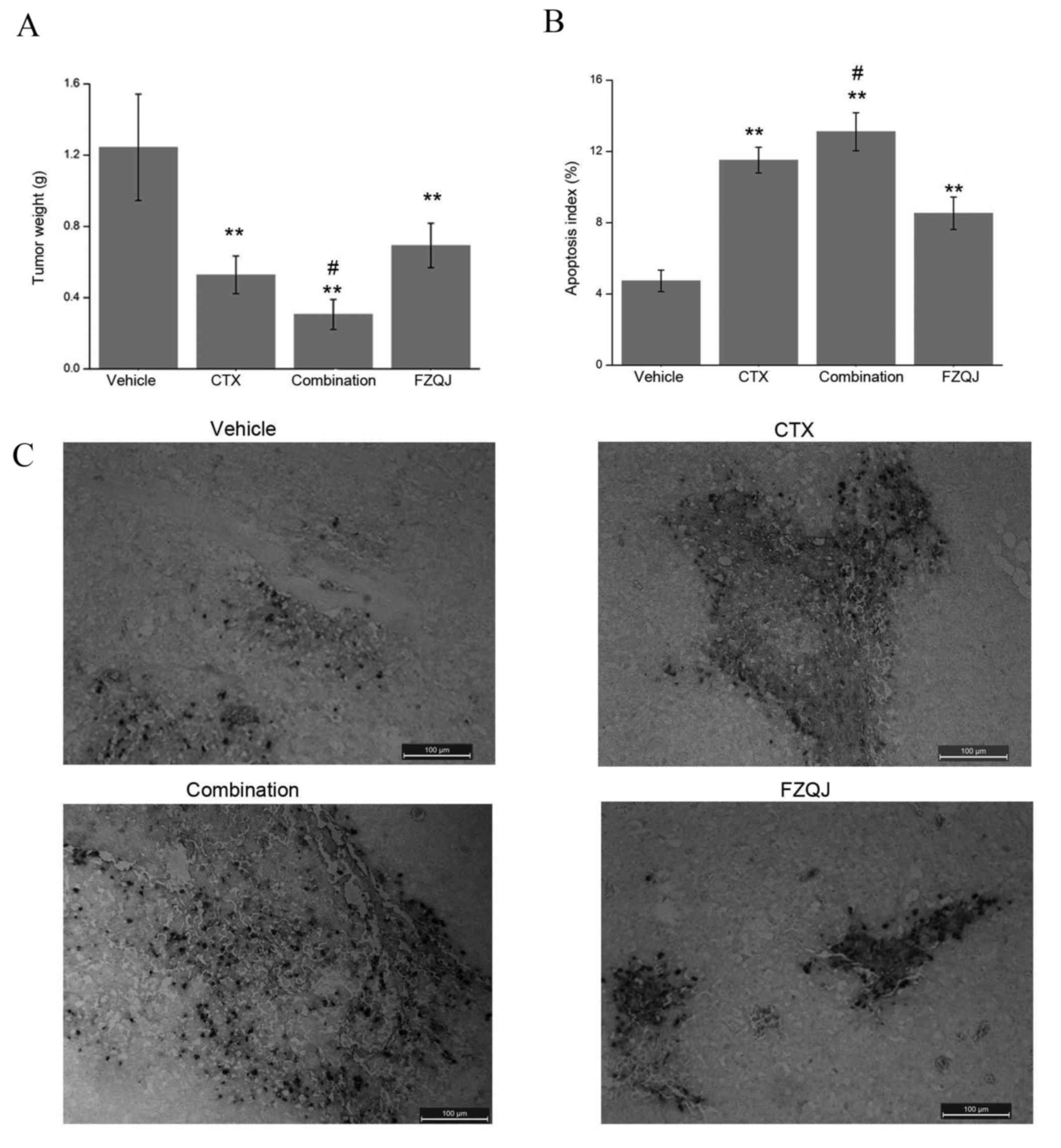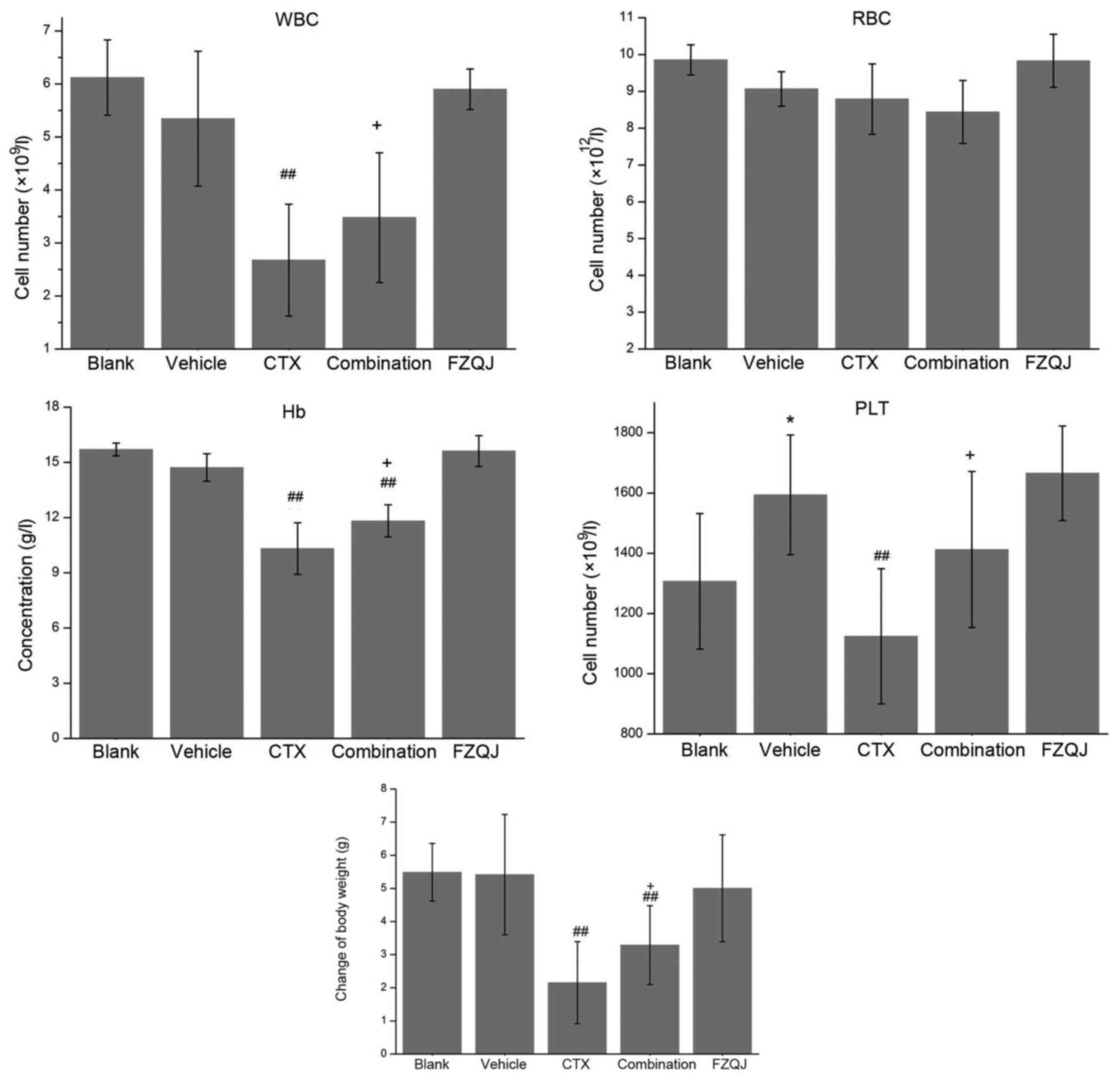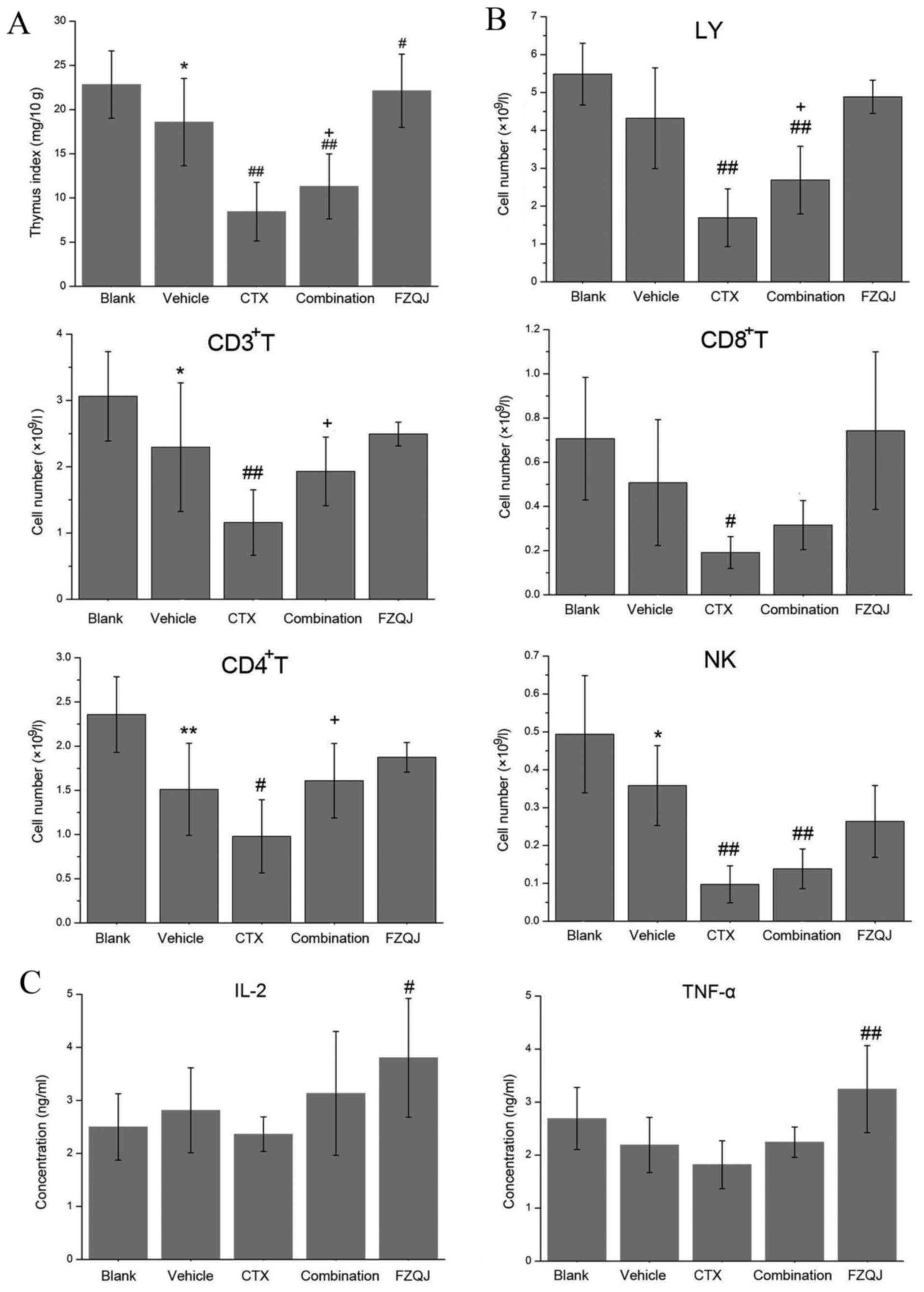|
1
|
Bosch FX, Ribes J, Cléries R and Díaz M:
Epidemiology of hepatocellular carcinoma. Clin Liver Dis.
9:191–211, v. 2005. View Article : Google Scholar : PubMed/NCBI
|
|
2
|
Tanaka M, Katayama F, Kato H, Tanaka H,
Wang J, Qiao YL and Inoue M: Hepatitis B and C virus infection and
hepatocellular carcinoma in China: A review of epidemiology and
control measures. J Epidemiol. 21:401–416. 2011. View Article : Google Scholar : PubMed/NCBI
|
|
3
|
European Association for the Study of the
Liver; European Organisation for Research and Treatment of Cancer:
EASL-EORTC clinical practice guidelines: Management of
hepatocellular carcinoma. J Hepatol. 56:908–943. 2012. View Article : Google Scholar : PubMed/NCBI
|
|
4
|
Wörns MA, Weinmann A, Schuchmann M and
Galle PR: Systemic therapies in hepatocellular carcinoma. Dig Dis.
27:175–188. 2009. View Article : Google Scholar : PubMed/NCBI
|
|
5
|
Konkimalla VB and Efferth T:
Evidence-based Chinese medicine for cancer therapy. J
Ethnopharmacol. 116:207–210. 2008. View Article : Google Scholar : PubMed/NCBI
|
|
6
|
Wang Z, Li J, Ji Y, An P, Zhang S and Li
Z: Traditional herbal medicine: A review of potential of inhibitory
hepatocellular carcinoma in basic research and clinical trial. Evid
Based Complement Alternat Med. 2013:2689632013.PubMed/NCBI
|
|
7
|
Zhang J and Shan BE: Recent advances on
traditional Chinese medicine in immunoregulation and anticancer
mechanism. Chin J Immunol. 22:385–388. 2006.(In Chinese).
|
|
8
|
Wu QX and Xu ZY: Advances on traditional
Chinese medicine in myelosuppression. Zhejiang J Tradit Chin Med.
45:618–621. 2010.(In Chinese).
|
|
9
|
Shi Y, Wang CH and Gong XG:
Apoptosis-inducing effects of two anthraquinones from Hedyotis
diffusa WILLD. Biol Pharm Bull. 31:1075–1078. 2008. View Article : Google Scholar : PubMed/NCBI
|
|
10
|
Lin SY, Shen CY, Jiang JP, Wu LQ, Dai TY,
Qian WB and Meng HT: Apoptosis of multiple myeloid cells induced by
polysaccharides extracts from Hedyotis diffusa and its mechanism.
Zhonghua Xue Ye Xue Za Zhi. 34:337–340. 2013.(In Chinese).
PubMed/NCBI
|
|
11
|
Zhou QX, Liu F, Zhang JS, Lu JG, Gu ZL and
Gu GX: Effects of triterpenic acid from Prunella vulgaris L. on
glycemia and pancreas in rat model of streptozotozin diabetes. Chin
Med J (Engl). 126:1647–1653. 2013.PubMed/NCBI
|
|
12
|
Si WK, Cheng A, Li P, Liu B, Gao LH and
Yao J: Study on apoptosis of human hepatoma cell line HepG2 induced
by matrine. Acta Academiae Medicinae Militaris Tertiae. 23:816–820.
2001.(In Chinese).
|
|
13
|
Chen XZ, Li JN, Zhang YQ, Cao ZY, Liu ZZ,
Wang SQ, Liao LM and Du J: Fuzheng Qingjie recipe induces apoptosis
in HepG2 cells via P38 MAPK activation and the
mitochondria-dependent apoptotic pathway. Mol Med Rep. 9:2381–2387.
2014.PubMed/NCBI
|
|
14
|
Lee CS and Gibson NW: DNA interstrand
cross-links induced by the cyclopropylpyrroloindole antitumor agent
bizelesin are reversible upon exposure to alkali. Biochemistry.
32:9108–9114. 1993. View Article : Google Scholar : PubMed/NCBI
|
|
15
|
Pisani F, Sciuto R, Dessanti ML,
Giannarelli D, Kayal R, Rea S, Marchesi F and Marino M: Long term
efficacy and safety of Fludarabine, Cyclophosphamide and Rituximab
regimen followed by (90)Y-ibritumomab tiuxetan consolidation for
the treatment of relapsed grades 1 and 2 follicular lymphoma. Exp
Hematol Oncol. 4:172015. View Article : Google Scholar : PubMed/NCBI
|
|
16
|
Fosså A, Muer M, Kasper C, Welt A, Seeber
S and Nowrousian MR: Bolus vincristine and epirubicin with
cyclophosphamide and dexamethasone (VECD) as induction and salvage
treatment in multiple myeloma. Leukemia. 12:422–426. 1998.
View Article : Google Scholar : PubMed/NCBI
|
|
17
|
Cain JM, Collins C, Petersdorf S, Figge
DC, Tamimi HK, Greer BE and Livingston RB: Phase II study of
high-dose cisplatin, etoposide, and cyclophosphamide for refractory
ovarian cancer. Am J Obstet Gynecol. 174:1688–1694. 1996.
View Article : Google Scholar : PubMed/NCBI
|
|
18
|
Tsujii H, Kamada T, Tsuji H, Takamura A,
Matsuoka Y, Usubuchi H and Irie G: Improved results in the
treatment of nasopharyngeal carcinoma using combined radiotherapy
and chemotherapy. Cancer. 63:1668–1672. 1989. View Article : Google Scholar : PubMed/NCBI
|
|
19
|
Tang TC, Man S, Lee CR, Xu P and Kerbel
RS: Impact of metronomic UFT/cyclophosphamide chemotherapy and
antiangiogenic drug assessed in a new preclinical model of locally
advanced orthotopic hepatocellular carcinoma. Neoplasia.
12:264–274. 2010. View Article : Google Scholar : PubMed/NCBI
|
|
20
|
Fraiser LH, Kanekal S and Kehrer JP:
Cyclophosphamide toxicity. Characterising and avoiding the problem.
Drugs. 42:781–795. 1991. View Article : Google Scholar : PubMed/NCBI
|
|
21
|
Lozano GM, Bejarano I, Espino J, González
D, Ortiz A, García JF, Rodríguez AB and Pariente JA: Relationship
between caspase activity and apoptotic markers in human sperm in
response to hydrogen peroxide and progesterone. J Reprod Dev.
55:615–621. 2009. View Article : Google Scholar : PubMed/NCBI
|
|
22
|
Taniguchi T and Minami Y: The IL-2/IL-2
receptor system: A current overview. Cell. 73:5–8. 1993. View Article : Google Scholar : PubMed/NCBI
|
|
23
|
Locksley RM, Killeen N and Lenardo MJ: The
TNF and TNF receptor superfamilies: Integrating mammalian biology.
Cell. 104:487–501. 2001. View Article : Google Scholar : PubMed/NCBI
|
|
24
|
Cao ZY and Lan L: Experience of Professor
Du Jian in fighting against gastrointestinal cancer by integrative
therapy. J Fujian Univ Tradit Chin Med. 21:51–53. 2011.(In
Chinese).
|
|
25
|
Qi F, Li A, Inagaki Y, Gao J, Li J, Kokudo
N, Li XK and Tang W: Chinese herbal medicines as adjuvant treatment
during chemo- or radio-therapy for cancer. Biosci Trends.
4:297–307. 2010.PubMed/NCBI
|
|
26
|
Zhang Q, Kang X and Zhao W: Antiangiogenic
effect of low-dose cyclophosphamide combined with ginsenoside Rg3
on Lewis lung carcinoma. Biochem Biophys Res Commun. 342:824–828.
2006. View Article : Google Scholar : PubMed/NCBI
|
|
27
|
Dai Z, Wan X, Kang H, Ji Z, Liu L, Liu X,
Song L, Min W and Ma X: Clinical effects of shenqi fuzheng
injection in the neoadjuvant chemotherapy for local advanced breast
cancer and the effects on T-lymphocyte subsets. J Tradit Chin Med.
28:34–38. 2008. View Article : Google Scholar : PubMed/NCBI
|
|
28
|
Yin XM and Ding WX: Death receptor
activation-induced hepatocyte apoptosis and liver injury. Curr Mol
Med. 3:491–508. 2003. View Article : Google Scholar : PubMed/NCBI
|
|
29
|
Nagai H, Matsumaru K, Feng G and Kaplowitz
N: Reduced glutathione depletion causes necrosis and sensitization
to tumor necrosis factor-alpha induced apoptosis in cultured mouse
hepatocytes. Hepatology. 36:55–64. 2002. View Article : Google Scholar : PubMed/NCBI
|
|
30
|
Liu H, Lo CR and Czaja MJ: NF-kappaB
inhibition sensitizes hepatocytes to TNF-induced apoptosis through
a sustained activation of JNK and c-Jun. Hepatology. 35:772–778.
2002. View Article : Google Scholar : PubMed/NCBI
|
|
31
|
Guicciardi ME, Deussing J, Miyoshi H,
Bronk SF, Svingen PA, Peters C, Kaufmann SH and Gores GJ: Cathepsin
B contributes to TNF-alpha-mediated hepatocyte apoptosis by
promoting mitochondrial release of cytochrome c. J Clin Invest.
106:1127–1137. 2000. View Article : Google Scholar : PubMed/NCBI
|
|
32
|
Owen-Schaub LB, Crump WL III, Morin GI and
Grimm EA: Regulation of lymphocyte tumor necrosis factor receptors
by IL-2. J Immunol. 143:2236–2241. 1989.PubMed/NCBI
|
|
33
|
Lin J, Li Q, Chen H, Lin H, Lai Z and Peng
J: Hedyotis diffusa Willd. extract suppresses proliferation and
induces apoptosis via IL-6-inducible STAT3 pathway inactivation in
human colorectal cancer cells. Oncol Lett. 9:1962–1970.
2015.PubMed/NCBI
|
|
34
|
Woo HJ, do Jun Y, Lee JY, Woo MH, Yang CH
and Kim YH: Apoptogenic activity of
2α,3α-dihydroxyurs-12-ene-28-oic acid from Prunella vulgaris var.
lilacina is mediated via mitochondria-dependent activation of
caspase cascade regulated by Bcl-2 in human acute leukemia Jurkat T
cells. J Ethnopharmacol. 135:626–635. 2011. View Article : Google Scholar : PubMed/NCBI
|
|
35
|
Carrington PA, Carr TF, Stevens RF and
Evans DI: Thrombocytosis associated with solid tumors in children.
Pediatr Hematol Oncol. 9:289–291. 1992. View Article : Google Scholar : PubMed/NCBI
|
|
36
|
Mantadakis E, Tsalkidis A and
Chatzimichael A: Thrombocytosis in childhood. Indian Pediatr.
45:669–677. 2008.PubMed/NCBI
|
|
37
|
Yang B, Xiao B and Sun T: Antitumor and
immunomodulatory activity of Astragalus membranaceus
polysaccharides in H22 tumor-bearing mice. Int J Biol Macromol.
62:287–290. 2013. View Article : Google Scholar : PubMed/NCBI
|
|
38
|
Sun Y, Hersh EM, Talpaz M, Lee SL, Wong W,
Loo TL and Mavligit GM: Immune restoration and/or augmentation of
local graft versus host reaction by traditional Chinese medicinal
herbs. Cancer. 52:70–73. 1983. View Article : Google Scholar : PubMed/NCBI
|
|
39
|
Sun Y, Hersh EM, Lee SL, McLaughlin M, Loo
TL and Mavligit GM: Preliminary observations on the effects of the
Chinese medicinal herbs Astragalus membranaceus and Ligustrum
lucidum on lymphocyte blastogenic responses. J Biol Response Mod.
2:227–237. 1983.PubMed/NCBI
|
|
40
|
Yue GG, Chan BC, Han XQ, Cheng L, Wong EC,
Leung PC, Fung KP, Ng MC, Fan K, Sze DM and Lau CB:
Immunomodulatory activities of Ganoderma sinense polysaccharides in
human immune cells. Nutr Cancer. 65:765–774. 2013. View Article : Google Scholar : PubMed/NCBI
|
|
41
|
Kohguchi M, Kunikata T, Watanabe H, Kudo
N, Shibuya T, Ishihara T, Iwaki K, Ikeda M, Fukuda S and Kurimoto
M: Immuno-potentiating effects of the antler-shaped fruiting body
of Ganoderma lucidum (Rokkaku-Reishi). Biosci Biotechnol Biochem.
68:881–887. 2004. View Article : Google Scholar : PubMed/NCBI
|
|
42
|
Chen SM, Tsai YS, Lee SW, Liu YH, Liao SK,
Chang WW and Tsai PJ: Astragalus membranaceus modulates Th1/2
immune balance and activates PPARγ in a murine asthma model.
Biochem Cell Biol. 92:397–405. 2014. View Article : Google Scholar : PubMed/NCBI
|
|
43
|
Wang J, Shan A, Liu T, Zhang C and Zhang
Z: In vitro immunomodulatory effects of an oleanolic acid-enriched
extract of Ligustrum lucidum fruit (Ligustrum lucidum supercritical
CO2 extract) on piglet immunocytes. Int Immunopharmacol.
14:758–763. 2012. View Article : Google Scholar : PubMed/NCBI
|
|
44
|
Zhu X and Zhu B: Effect of Astragalus
membranaceus injection on megakaryocyte hematopoiesis in anemic
mice. Hua Xi Yi Ke Da Xue Xue Bao. 32:590–592. 2001.(In Chinese).
PubMed/NCBI
|
|
45
|
Wang GY, Li ZB, Shi JX, Wang H, Gao QF,
Gen LF, Zhu JJ and Zhao QS: Oldenlandia diffusa protects against
indomethacin-induced injury of the gastrointestinal mucosa in rats.
Hebei J Tradit Chin Med. 23:70–71. 2001.(In Chinese).
|

















